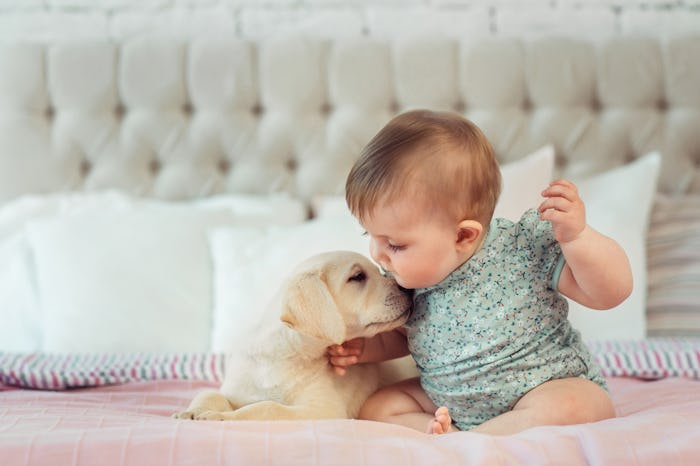Life

There's Actually A Reason Why Your Dog Loves To Sniff Your Baby, According To Experts
Ah, that new baby smell. There is truly nothing like the scent of a newborn. I know that I can get lost in a good cuddle session with a bundle of joy and the intoxicating smell of their newness, but what about my dog? Is there a reason why dogs sniff babies?
When my husband and I first brought our son home from the hospital, our American Staffordshire Terrier went sniff-crazy. She smelled every inch of our son from head to toe while happily wagging her tail as fast as she could. Does man's best friend love new babies as much as humans do, or is there something else that attracts dogs to babies?
In a recent interview with Romper, Alexandra Basset, CPDT-KA, lead trainer and behavior specialist at Dog Savvy Los Angeles, explains why dogs like to sniff babies. "Dogs sniff babies because they cast off a variety of smells that can attract dogs, from the scent of the baby itself to the scent of what's in the babies' diapers or even the scent of spit-up. Things that we normally find disgusting are very alluring to dogs," Basset says.
Dogs have a sense of smell that is much more enhanced than humans. In an article for Purina, Dr. Joanne Righetti, an animal behavior expert explained this phenomenon. "The area of the canine brain that is devoted to analyzing scent is 40 times greater than that of the human and dogs can identify smells at least 1,000 times better than we can! The dog’s superior sense of smell comes from 220 million olfactory receptors in their nose," she said.
Because of this superior sense of smell, dogs can tell the difference between babies and adults based on their unique scent. Jennifer Henson, resident veterinary technician at Bobbi Colorado's Canine Camp in Austin, Texas, tells Romper that babies smell differently than adults. Henson also gives insight into the importance of introducing dogs to babies. "Every dog is different and will react to different situations differently. Why is the introduction so important? The same reason introducing anyone into a family is important; they are both important members of the family and need to be able to get along," Henson says.
Dogs use their sense of smell to learn about the world around them. When a dog sniffs a baby, they are learning everything they can about the baby and becoming familiar with them. This is why introducing a baby to a dog in the proper way is crucial.
"The best way to introduce a dog to a baby is by keeping the dog on a leash and the baby in your lap while allowing the dog to inspect and sniff the baby for a brief time period. That way it's easy to end the interaction if the baby shows signs of not enjoying the exchange and it's easy to get control of the dog if the dog gets too excited," Basset says.
If a dog can smell a new baby in a controlled environment, it keeps the interaction safe and pleasant for all involved. This is important because as Basset explains, the dog's next instinct after smelling a baby might be to lick.
"If the baby smells good, the dog will probably try to lick it at some point," Basset says. "Some babies will like this, some won't — so it's best to err on the side of keeping the interaction brief and positive for both parties and simply remove the dog's access to the baby after the initial intro to see how the baby feels about it. If the baby would like to continue interacting with the dog, it will show you by reaching out for the dog, so as long as the parent is comfortable with the exchange, another interaction can be allowed."